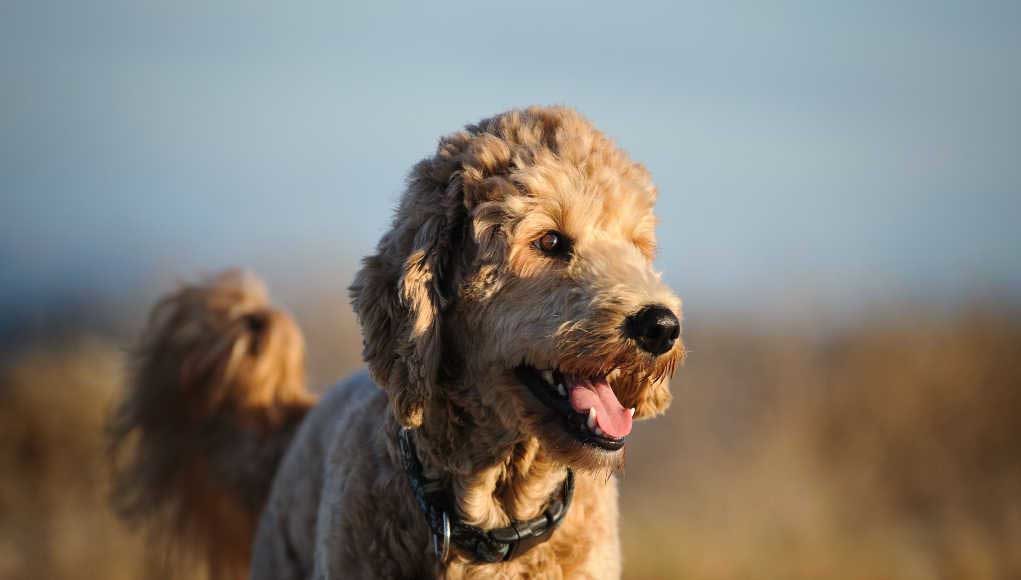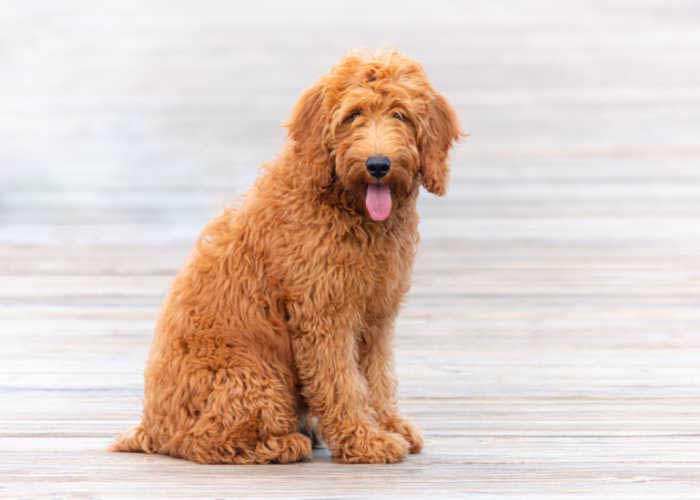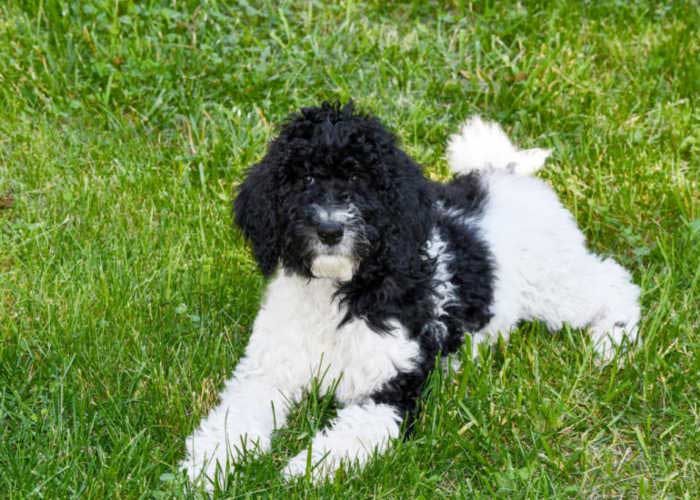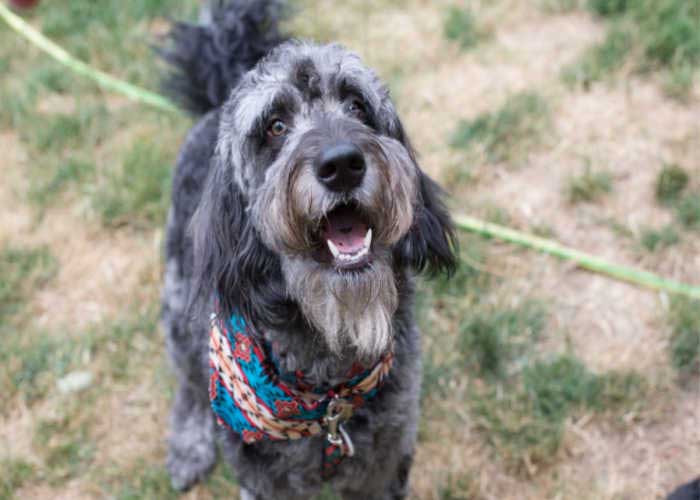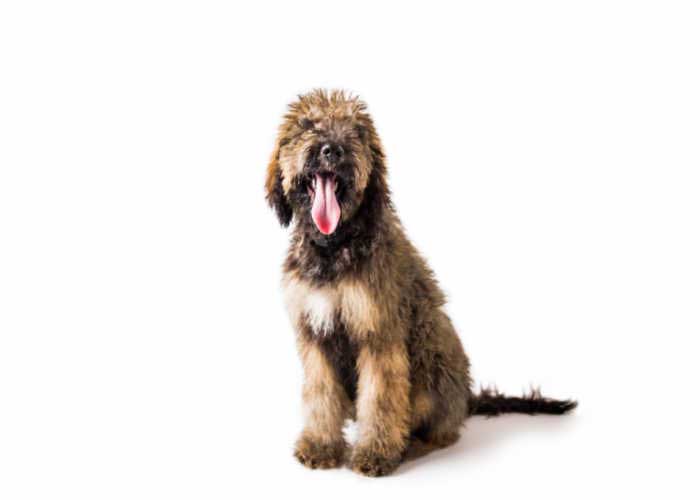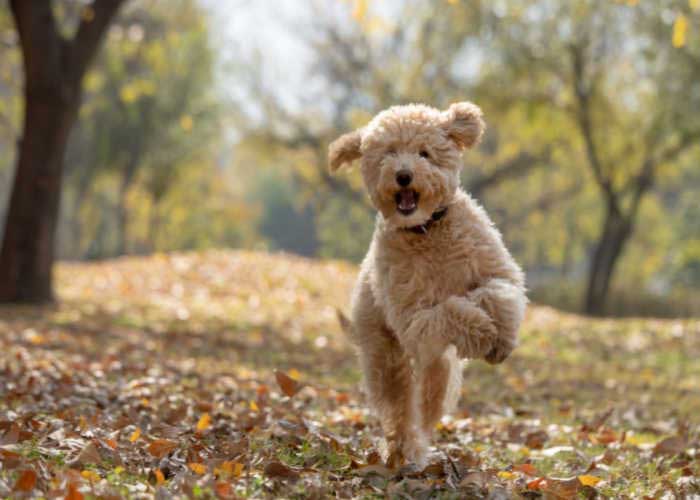Table of Contents
The Goldendoodle dog breed is a loving dog who makes friends with almost everyone he meets. Learn more about living with this designer breed!
The adorable Goldendoodle is a crossbreed from mixing the Golden Retriever with a Poodle.
As expected, this good-natured offspring is intelligent because the two founding breeds are among the top 5 smartest dogs that are easy to train.
He gets along with everyone, young and old. Although he has proven himself to be an excellent family dog, he does not fit to be a watchdog due to his all-around friendliness, even to strangers.
The Goldendoodle dog is a confident fur baby with a well-rounded personality suitable for service or therapy work.
One of the things that people appreciate about this dog is the hypoallergenic quality of his coat which makes him a popular option for dog owners with allergies.
He was purposely bred to function as the perfect canine companion with his loyalty and eagerness to please.
Today, the Goldendoodle breed enjoys growing popularity as an affectionate and gentle crossbreed good for novice dog parents and experienced canine families alike.
The American Kennel Club does not recognize the breed. Since he is not truly a breed of its own, he can’t be AKC registered.
Goldendoodle Dog Breed Standard
Since the Goldendoodle does not appear in the registry, there are no standards that Goldendoodle breeders are aiming for. Looks and sizes are not as certain as those of purebreds.
Height and Weight
The Goldendoodle dog varies in growth patterns. There is no agreed size but the following classes are what organizations recognize.
Teacup
Stands around 11 inches tall and weighs less than 13 pounds making this extra small pooch popular but rare.
Petite
Grows about 14 inches tall and typically 25 pounds or less in mass, making him suitable for life in an apartment but does better with the space provided by a fenced yard.
Miniature
Ranging from 14 to 17 inches tall and usually weighs between 26 to 35 pounds, making this an ideal size for families.
Medium
A popular size with a height from 17 to 20 inches and 36 to 50 pounds in weight making the dog ideal for active families.
Standard
This is the largest size standing more than 20 inches tall and weighing from 50 up to 90 pounds.
Coat
The fur can be curly, wavy, or straight in many colors such as cream, apricot, red, chocolate, and black.
The patterns and markings are like the ones below:
Parti-color
Abstract or Chrome
Merle
Phantom
Goldendoodle Family Life
The Goldendoodle breed actively enjoys human company.
As a full-fledged family member, it thrives on constant contact with people it loves. If left for too long, your pooch will suffer from separation anxiety.
With that being said, it should not live outside the house or be kept in a kennel.
Since both parent breeds are friendly, it makes a wonderful family companion as it gets along well with children and other pets.
Even though loyal and trustworthy to his humans, this dog may be too friendly to be the guardian of the household.
With his accepting nature, he doesn't show aggression towards other animals and is highly patient with kids of all ages. In fact, they're naturally careful with infants and toddlers.
But just like all breeds, no matter the size, always teach children how to approach and treat dogs.
The Goldendoodle dog breed can be a great buddy but no matter how friendly, you should never leave him all by himself with a child.
Goldendoodle Dog History
In the late 1990s, breeders began to market this new breed. They were inspired by the creation of the Labradoodle – a combination of a Standard Poodle with a Labrador Retriever bred in Australia in 1988 by Wally Conron.
The idea of crossbreeding the Golden Retriever with a Poodle was a success as a compatible furry friend for many dog parents. The public adored the breed for its allergen-friendly coat.
As the development continued, different sizes were created to accommodate different lifestyles and please all sorts of dog owners.
These non-aggressive dogs became a hit and are perfect candidates for service work as well as emotional support animals.
Goldendoodle Breed Health
Goldendoodles inherited some of the best traits from their parent breeds, along with good health.
Therefore, they are generally healthy but there is no guarantee that they will not inherit ailments.
Hypothyroidism
This is caused by a thyroid hormone deficiency. Hypothyroidism may lead to infertility, obesity, and lack of energy.
Although not curable, it is manageable with oral medication and a proper diet throughout his life.
Hip Dysplasia
It is the malformation of the hip joints as the dog ages. It can cause pain and lameness and, over time, into arthritis.
This may be hereditary but becomes worse due to environmental factors such as rapid growth from a change of diet or incurred injuries.
Patellar Luxation
In this condition, the kneecap is out of its normal place. Patellar luxation causes lameness reducing the mobility of the dog.
It's a hereditary problem that can be treated with physical therapy. Unfortunately, severe cases may need surgery.
Progressive Retinal Atrophy (PRA)
This is an eye disorder that eventually causes blindness in your dog. It is detectable before the dog shows signs of blindness through an ophthalmologist evaluation.
Gastric Dilatation-Volvulus
Gas production happens due to eating and drinking rapidly. Bloating becomes life-threatening once the stomach twists and cuts off the blood supply.
Ear infection
Due to their fondness for water, moisture may be trapped on the ears, hence needing frequent examination and cleaning to prevent bacteria.
How to Care for Goldendoodles
Exercise
Goldendoodle dogs require to play and exercise. Boredom may result in undesirable behaviors, including digging or barking.
Daily walks or outdoor play sessions fill their fitness needs.
You may have 20 to 30 minutes of physical activities or do swimming since they love water. These outgoing dogs are average in energy level, so a good romp in the yard will do.
A miniature pup may enjoy apartment living but large ones require room to move or a yard to run in. Still, the exercise needed is only medium.
Training the Goldendoodle Breed
To ensure good behavior, proper socialization and attention should start early and continue throughout the dog's life.
Quick to learn and eager to please, these crossbreeds do best with positive teaching methods and reward-based training.
As with all breeds, Goldendoodle breeds happily learn tricks and obedience when given treats.
Harsh corrections could damage their confidence and positive personality.
Early training and exposure to the environment, people, and experiences will help avoid shyness and insecurity. Puppies with the ideal temperament are playful and willing to approach the public.
Goldendoodle dog breeds are easy to train thanks to the big brains they inherit from both parents. They are perfect for first-time or experienced trainers.
Crate training isn't locking them up but rather giving them their own space to calm their anxiety.
This can help to prevent them from getting into trouble if you're not around to supervise.
Ensure that your Goldendoodle puppy grows up to be a well-rounded dog and his social skills polished.
Grooming
Although with little to no shedding, the Goldendoodle still requires consistent grooming to keep the hair healthy and in the best condition possible.
Bathing is not much needed because it may cause the coat and skin to lose necessary oils and moisture when frequently done. He requires a bath only when it's necessary to avoid dry skin.
Brush the fur at least once a week to avoid matting. Owners mostly opt to clip the coat for easier maintenance.
The Goldendoodle dog’s teeth should be brushed at least two or three times a week to prevent gum disease and bad breath. Daily brushing will even improve dental health.
Trim nails once or twice a month, as long as you don't hear them clicking on the floor.
Check the ears regularly for any indication of infection.
Goldendoodle Diet and Nutrition
Your pet’s diet should be appropriate to his age with your veterinarian's supervision and approval.
Whether commercially manufactured or home-prepared, high-quality dog food should do well for your Goldendoodle.
Limit treats and consult your veterinarian about healthy options.
Monitor your dog’s calorie consumption and weight level to find out the proper portions and nutrients that your dog needs at different stages of life.
Divide the food into two meals as opposed to once a day because they have a risk of bloating.
Ideal Owner of Goldendoodle Dogs
The Goldendoodle breed can thrive in both city and country settings.
He may do well in apartment living depending on the size but he will appreciate it if there is a yard to burn off his high spirits.
Not known to be aggressive, he is a good match for first-time or timid owners.
The Goldendoodle dog breed is a great option for people with allergies because doesn't shed much and the fur is allergen-friendly.
This playful sweetie makes an excellent match for active families who like to include their dogs in all of their outdoor escapades.
This naturally water-loving pooch is happiest to be your swimming buddy!
He can be your durable hiking furry friend or he could just snuggle up and lie down with you till the rest of the day.
FAQs about Goldendoodle Breeds
Does the Goldendoodle dog breed bark a lot?
Goldendoodles don't excessively bark like other breeds. In fact, they won't even bark even if someone is knocking on your door.
These dogs are curious, friendly dogs and calm around humans and other dogs. However, if your Doodle is a barker, he might be sad, hurt, or in fear.
Is the Goldendoodle dog breed a good pet?
Goldendoodle dogs love people and also get along great with other animals in the family — making them a great choice as pets.
They are far too friendly to make good guard dogs or watchdogs and would more likely welcome or try to befriend a stranger than warn them off.
Goldendoodle breeds are not aggressive.
They are well-loved because they are one of the sweetest dog breeds that you can own. They have a boundless amount of love for their owners.
Does the Goldendoodle dog breed like to cuddle?
Goldendoodle dog breeds are one of the most affectionate and friendly dogs, which is why they make such great pets and fantastic cuddle buddies.
Due to their highly sociable traits, Goldendoodles are prone to suffer from separation anxiety when left alone.
These are not the types of dogs that you can leave alone for long periods. They need to be around people most of the time.
Goldendoodle Dog Breeds Summary
If you want fur babies that are reliable and excellent for first-time dog owners, Goldendoodles could be the right canine companions for you!
These types of dogs are eager playmates for kids and are easy to train as companions and athletes.
These mixed-breed dogs fit in well with families and crave human interaction. They have a great desire to please and to learn and are certified versatile working dogs.
So, are they the dogs that you desire?
People purchase Goldendoodle dogs without the ability to commit to the lifetime of these animals. If you want to bring a dog home, consider adopting one.
There are many Goldendoodle breeds in need of fostering.
Still, gather more information before getting a puppy of your own to see compatibility with your lifestyle.
You may visit various breeders and see the dogs yourself. Find a reputable breeder who will show health clearances to prove that they are clear of health conditions.
Goldendoodle Association of North America (GANA) is an organization for Goldendoodle Enthusiasts, both Breeders and Pet Owners, to promote and guide the development of Goldendoodle puppies to achieve breed standards.
The club supports responsible breeding and pet ownership.
To ensure you are working with a breeder that meets these standards, look for the GANA logo on their website if you are considering adding Goldendoodle dog breeds to your home.


